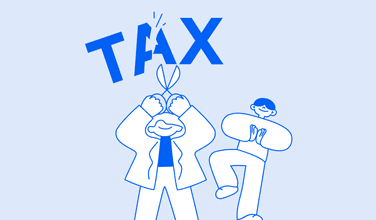- Osome Blog SG
- Singapore Corporate Income Tax: Rates, System, Reliefs
Singapore Corporate Income Tax: Rates, System, Reliefs
- Modified: 8 October 2025
- 7 min read
- Taxes & Compliance


Ruth Dsouza
Author
Ruth Dsouza Prabhu is a content developer with a passion for turning ideas into clear, engaging narratives. With a strong background in marketing communications and lifestyle writing, she simplifies complex business topics for entrepreneurs. Her work spans strategy, storytelling, and thought leadership, always focused on clarity, credibility, and impact.

Imran Marican
Reviewer
Imran Marican, ATA SCTP member, is our Corporate Tax Assistant Manager based in Singapore, with almost a decade of experience in Singapore corporate tax. With in-depth knowledge of Singapore corporate tax law and regulations, he can help with corporate tax compliance that matters to every company. While our business writers transform complicated tax jargon into easy-to-understand concepts, as a reviewer for the Osome blog, Imran ensures our content is accurate and relevant, helping our readers boost their businesses with helpful tips and insights.
Singapore’s corporate income tax system is one of the most business-friendly in the world, with a flat 17% rate, attractive exemptions, and clear filing processes. Still, knowing how the system works — from exemptions and rebates to filing requirements — is essential to stay compliant and avoid penalties.
Key Takeaways
- Singapore’s corporate income tax is a flat 17% with exemptions and rebates available for qualifying companies.
- Companies must file Estimated Chargeable Income within three months of the financial year-end and Form C-S/C by 30 November the following year.
- Professional services like Osome help ensure accurate filings, track deadlines, and simplify compliance.
What Is Corporate Income Tax?
Corporate income tax is a tax on the profits earned by companies operating in Singapore. The Inland Revenue Authority of Singapore (IRAS) administers this tax, which is charged at a flat rate of 17% on chargeable income. Unlike some countries, Singapore uses a single-tier territorial system. This means:
- Companies are taxed only once on their profits.
- Dividends distributed to shareholders are tax-exempt.
- Foreign-sourced income is generally not taxed unless received in Singapore, with some exemptions applying.
This framework makes Singapore attractive for both local businesses and multinational corporations, while ensuring clarity and simplicity in tax compliance.
Corporate Income Tax System in Singapore
Singapore’s corporate income tax (CIT) applies to your company’s profits after deducting expenses but before paying out dividends. The sum of money the tax is applied to is called chargeable income, which may be reduced by various tax incentives, reliefs, and allowances.
Single-tier system
Singapore operates a single-tier system, which means a company’s profits are taxed only once. Dividends distributed to shareholders are exempt from further taxation. This contrasts with a two-tier system, where profits and dividends would be taxed separately, effectively resulting in double taxation.
Flat-rate tax
The corporate income tax rate in Singapore is 17% for both local and foreign companies. The rate has been gradually reduced over the years to remain competitive.
Territorial basis
Singapore taxes income on a territorial basis. This means:
- Profits earned from business carried out in Singapore are taxed at 17%.
- Foreign-sourced income is taxed only when it is received and remitted into Singapore.
For example, a Singapore-registered company with overseas operations will pay CIT only on the portion of income that is remitted or deemed remitted. To avoid double taxation, Singapore has established bilateral Avoidance of Double Taxation Agreements (DTAs) with multiple countries. You can check the full list of DTA countries on the IRAS website to see if your jurisdiction is covered.
Exemptions & Reliefs
Singapore offers several tax schemes to reduce the effective tax rate for companies, particularly beneficial for startups and SMEs. Here's an overview of the key corporate tax exemptions and reliefs available:
Start-Up Tax Exemption (SUTE)
Chargeable Income | Exemption | Amount Exempted |
|---|---|---|
| First $100,000 | 75% | $75,000 |
| Next $100,000 | 50% | $50,000 |
| Maximum Exemption | $125,000 |
Eligibility
To qualify for the Start-Up Tax Exemption (SUTE) scheme, a company must meet all of the following conditions:
- Be incorporated in Singapore.
- Be a Singapore tax resident for the relevant Year of Assessment (YA).
- Have its total share capital beneficially held directly by no more than 20 shareholders throughout the basis period for that YA.
- All shareholders must be individuals, or at least one shareholder must be an individual holding at least 10% of the issued ordinary shares.
Exclusions
The SUTE scheme does not apply to:
- Companies whose principal activity is investment holding.
- Companies engaged in property development for sale, investment, or both.
The SUTE is available only for the first 3 YAs, even if the company incurs losses or has no income during any of those years.
Partial Tax Exemption (PTE)
Here are the requirements for the Partial Tax Exemption (PTE) scheme.
Chargeable Income | Exemption Rate | Amount Exempted |
|---|---|---|
| First $10,000 | 75% | $7,500 |
| Next $190,000 | 50% | $95,000 |
| Maximum Exemption | $102,500 |
- Eligibility: All companies, including those limited by guarantee, unless they are claiming the SUTE.
Corporate Income Tax (CIT) Rebate for YA 2025
- Rebate: 50% of tax payable.
- Cap: Up to $40,000.
- Additional Grant: Companies employing at least one local employee in 2024 will receive a non-taxable CIT rebate cash grant of $2,000.
To qualify for certain tax reliefs, it’s essential that your company is a Singapore tax resident and in a tax-payable position. This ensures you can fully benefit from exemptions like the Start-Up Tax Exemption or claim foreign tax credits where applicable.

Corporate Tax Assistant Manager
Foreign Tax Credit
Purpose
To alleviate double taxation on foreign income.
Eligibility
Companies may qualify for the Foreign Tax Credit (FTC) if they meet all of the following conditions:
- The company is a Singapore tax resident.
- The company is in a tax payable position in Singapore (i.e. not in a loss position).
- The company has paid foreign tax on income that is also subject to Singapore tax.
Conditions
- The foreign tax must have been paid in accordance with the provisions of an Avoidance of Double Taxation Agreement (DTA) between Singapore and the foreign jurisdiction.
- If the company qualifies, only a portion of the foreign tax suffered can be claimed as a credit, depending on the Singapore tax payable on that same income.
Companies that do not qualify for the SUTE will automatically receive the PTE.
Corporate Income Tax Rebate
Apart from exemptions and reliefs, companies in Singapore can benefit from a corporate income tax (CIT) rebate to reduce their tax payable. For Year of Assessment (YA) 2025, eligible companies can receive:
- Rebate: 50% of corporate tax payable
- Cap: Up to S$ 40,000
- Additional grant: Companies employing at least one local employee in 2024 are entitled to a non-taxable CIT rebate cash grant of S$ 2,000
Example
Emily’s company has a chargeable income of S$ 280,000 for YA 2025. Her corporate tax before the rebate is calculated as:
S$ 280,000 × 17% = S$ 47,600
Applying the 50% CIT rebate:
S$ 47,600 × 50% = S$ 23,800
Since this amount is below the maximum cap of S$ 40,000, the rebate applies in full. Additionally, Emily’s company employs one local staff member, so it also receives the S$ 2,000 CIT rebate cash grant.
In previous years, smaller rebates applied, such as 20% for YA 2019 (capped at S$ 10,000) and 25% for YA 2020 (capped at S$ 15,000). The current rebate for YA 2025 is more generous, reflecting the government’s continued support for businesses.
Filing Corporate Income Tax in Singapore
Filing corporate income tax (CIT) in Singapore is a straightforward process, but it's important to meet the deadlines and provide accurate information. Companies must submit two main forms to IRAS each year:
- Estimated Chargeable Income (ECI): Due within three months after the end of your financial year. Companies with an annual revenue of S$ 5 million or less and a nil ECI may qualify for a waiver. Companies using GIRO and filing ECI by the 26th day of the third month after FYE can also enjoy instalments on their tax payables.
- Final tax return (Form C-S or Form C): Due by 30 November of the following year from your FYE.
Companies should ensure that financial statements comply with Singapore Accounting Standards, as IRAS reviews these documents for accuracy. Filing on time helps avoid penalties and demonstrates good corporate governance.
Document | Due date | Issuer |
|---|---|---|
| Estimated Chargeable Income (ECI) | 3 months from the FYE | Company |
| Form C-S/C | By 15 December - for e-filing, by 30 November - for paper filing | Company |
| Notice of Assessment (NOA) | The date varies, depending on the complexity of the tax returns submitted | IRAS |
How Osome Helps With Corporate Income Tax
Managing corporate taxes can be complex, especially with Singapore’s exemptions, reliefs, and filing deadlines. Osome makes it simple. Our team of Chartered Accountants tracks all tax obligations, ensures accurate filing of ECI and Form C-S/C, and helps you stay compliant with IRAS requirements.
With Osome, you also get transparent pricing and a streamlined digital experience that saves time and reduces errors. Check out our accounting packages and pricing in Singapore to see how we can support your business.
Summary
Singapore’s corporate income tax system is straightforward but comes with several nuances, including exemptions, reliefs, and specific filing requirements. Companies are taxed at a flat 17% rate on chargeable income, with partial exemptions available for qualifying startups and additional rebates for eligible businesses. Filing obligations include submitting the Estimated Chargeable Income (ECI) within three months of the financial year-end and the final Form C-S/C by the November or December deadlines. Professional assistance, such as Osome’s accounting services, can simplify compliance, reduce errors, and save time for business owners.






